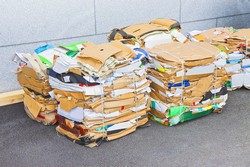Innovative technology to provide increased quality and quantity of recovered paper
The EU-funded SORT IT (Recovered paper sorting with innovative technologies) project developed novel sensor and measurement technologies for more efficient sorting and thus paper recovery. The SORT IT team carried out life-cycle analyses to assess the impacts of implementing new sorting techniques. Specifically, they demonstrated the environmental, economic and social benefits. The environmental and economic sustainability performance of newsprint paper and packaging paper life cycles were optimised thanks to improved quality of two recovered paper grades. Savings were achieved through lower consumption of the recovered paper, raw materials and energy, and more efficient logistics due to transportation of sorted paper with fewer impurities in it. Results show that manual and automatic sorting plants have little environmental impact from a total life-cycle perspective. Energy consumption is the major environmental contributor. Incineration of sorting rejects with energy recovery is a more attractive environmental option than landfill or incineration without energy recovery. Switching to automatic sorting led to enhanced environmental performance for the pulp and paper mills through increased pulp yield, lower amount of rejects and paper machine runnability. Project partners studied the economic aspects of sustainability concerning operational costs. The automatic sorting plant yielded excellent outcomes due to lower recovered paper consumption, labour and transportation costs. They also observed the social implications of higher efficiency together with production of improved quality of recovered paper at sorting plants through working conditions, health and safety, and employment structure and education, among others. Researchers integrated, tested and successfully demonstrated the efficiency of the developed automatic identification and sorting units at an industrial sorting plant with a monthly capacity of 2 000 tonnes. SORT IT technologies will allow the pulp and paper industry to remain competitive in the global economy. The day when the sector abandons manual sorting and shifts to fully automatic sorting plants may not be that far away.
Keywords
Recovered paper, SORT IT, paper sorting, paper recovery

